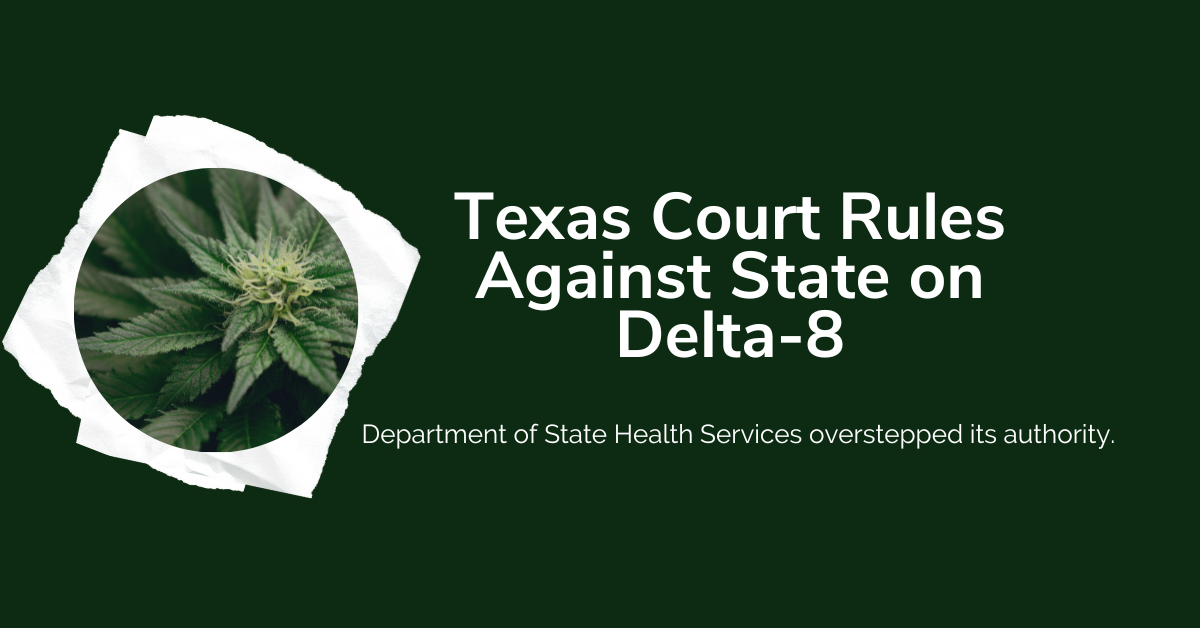In a recent ruling by the Texas Court of Appeals 3rd district, the Department of State Health Services (DSHS) was found to have overstepped its authority by placing delta-8 THC on the controlled substances list without following the proper rulemaking procedures outlined in the Administrative Procedure Act (APA). This decision has significant implications for the regulation of delta-8 THC in Texas and highlights the importance of adhering to established procedures when making substantial changes that could impact personal rights or businesses.
The case revolved around DSHS’s decision to classify delta-8 THC as a Schedule I controlled substance on its website in 2021. This move was met with opposition from various parties, including Hometown Hero and other appellees, who argued that DSHS’s actions violated the APA and caused imminent and irreparable harm.
One of the key legal issues in this case was sovereign immunity, which shields Texas and its entities from lawsuits and liabilities. To overcome a plea to jurisdiction based on sovereign immunity, plaintiffs must demonstrate that sovereign immunity is waived or inapplicable. In this case, the court found that the appellees had shown injuries traceable to DSHS’s actions and that enjoining the effectiveness of the modifications could redress these injuries.
Another important aspect of the case was the ultra vires claim, which is made when a government official is believed to have acted beyond their legal authority or powers. The Department and Commissioner argued that they acted within their legal rights, but the court recognized that Texas law allows for ultra vires claims when seeking prospective injunctive relief to stop wrongful actions from continuing in the future.
Additionally, the case involved an APA claim, with the Department and Commissioner contending that the Commissioner’s actions were not subject to an APA rule challenge. The court disagreed, affirming the trial court’s jurisdiction over the appellees’ APA claim against the Department. This decision underscores the need for state agencies to follow rulemaking procedures as outlined in the APA when making regulatory changes.
The ruling has several implications for the regulation of delta-8 THC in Texas. It clarifies that DSHS cannot unilaterally control substances like delta-8 THC without adhering to legislative procedures and rulemaking requirements. Instead, any action to control a substance must follow the framework set by the legislature and comply with the proper rulemaking procedures outlined in the APA. Furthermore, while DSHS has the authority to object to changes when the federal controlled substances list changes, it must still comply with the APA to make changes to the state list.
As for the possibility of the case going to the state supreme court, it appears unlikely given the circumstances. The Attorney General’s office initially asked the state supreme court to remove an injunction and hear the case, but the appeals court’s decision to uphold the injunction suggests that the state supreme court is unlikely to reverse a decision that could set a precedent limiting the power of a state agency over matters governed by the legislature. Additionally, recent events and potential conflicts of interest may further deter the Attorney General from pursuing the case at the state supreme court level.
In summary, the Texas Court of Appeals 3rd District’s ruling in the delta-8 THC case underscores the importance of following proper rulemaking procedures and legislative intent when regulating substances in the state. It has significant implications for the regulation of delta-8 THC and sets a precedent for how state agencies must approach such matters in the future.
Jax James
Executive Director, Texas NORML
Watch our October livestream where we discuss the Delta-8 ruling and potential TCUP changes.

